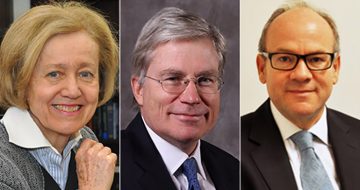Lady Hale and three other female firsts discuss humiliation, corruption accusations and how to overcome self-doubt

Lady Hale and three fellow female Supreme Court justices from across the globe gathered in Gray’s Inn Hall yesterday to discuss the most challenging moments of their lives.
The four trailblazers — all the first women appointed to their respective Supreme Courts — reflected on gender equality in law, the value of role models and what they hope their legacies will be. But the ‘First women of the Supreme Courts in Conversation’ event reached a peak when moderators Professor Penny Andrews and author Genevieve Muinzer asked about the biggest challenges the judges had faced.
Perhaps the darkest story shared came from Beverley McLachlin, a former Chief Justice of Canada. She recalled seeing a newspaper headline as she passed through a hotel lobby on the way to the airport, which said the Prime Minister of Canada had accused her of impropriety. “It was a long flight,” she remembers.
Understandably, philosophy student turned top judge McLachlin described this period as “very, very bad”. But, she continued:
“What was good about it was that the legal institutions and ordinary Canadian men and women were outraged at this attack and I was completely vindicated.”
Fellow panellist Georgina Wood, former Chief Justice of Ghana, was in office in 2015 when a number of her colleagues were accused of taking bribes and extorting money. Wood and her judicial council were adamant this shouldn’t be swept under the carpet, and ex-prosecutor Wood has since been praised for her thorough investigation of the claims. Even so, “it was a very trying moment”, she said at yesterday’s First 100 Years event.
The UK Supreme Court’s female first, Hale, and Susan Kiefel, a Chief Justice of Australia, had no brushes with corruption accusations to share. That said they’ve faced plenty of challenges in their lives — some perhaps at least partly because of their gender.
Lady Hale tells audience at @First100years event that she spent a month at a magic circle firm in London before she became an academic, but decided against pursuing a training contract as she “didn’t fancy the culture” pic.twitter.com/3MtAe1mcnQ
— Legal Cheek (@legalcheek) July 5, 2018
Academic turned judge Hale admitted she felt “humiliated” after being rejected from three professorships (despite believing she was the most qualified applicant for at least two of them). Cambridge law graduate Kiefel — who in the 1970s clerked at the law firm that became Norton Rose Fulbright — recalled a conversation with one judge who suggested she should give up her career for her husband and family.
Panellists’ feelings of self-doubt followed them through their legal careers. These may have been perpetuated early — in secondary school, a teacher told McLachlin she had a very good reading score but that “a girl can’t do anything with that”. Kiefel remembers that women seeking professional careers were expected to be nurses or teachers, “both noble professions, but I wasn’t attracted to either”. Hale was told she wasn’t clever enough to study history, so she studied law instead — and is now the president of the Supreme Court.
McLachlin said:
“When you think the bottom’s falling out of your world, think again. You may be underestimating yourself, you may be working against a prejudiced opinion that doesn’t matter. My advice to younger women is to keep your head up, plough on and you’ll get there in the end.”

